

Greg Jenner sur Twitter : "OK, Twitter! With your help, we've established Julie d'Aubigny, known as La Maupin, was real, did fence, did wear male clothes, and was an opera singer. But now to see if we can historicise her adventures. Interestingly, this sh. Girls on TV – who’s watching? Campaigner Jess Day looks at the links between toy marketing and children’s media, and why discussion of how girls are represented in media needs to talk about boys too.

@HopeJahren @docrocktex26 @Nebula63 Also one of the reasons men fought so hard/long to deny them the vote. Future Interrupted: All That Science Fiction Allows. Interzone #262 is a thing in the world.
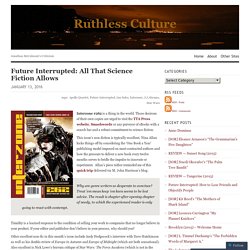
Those desirous of their own copies are urged to visit the TTA Press website, Smashwords or any purveyor of eBooks with a search bar and a robust commitment to science fiction. This issue’s non-fiction is typically excellent. Nina Allan kicks things off by considering the ‘One Book a Year’ publishing model imposed on most contracted authors and how the pressure to deliver a new book every twelve months serves to bridle the impulse to innovate or experiment.
Allan’s piece rather reminded me of this quick trip delivered via M. John Harrison’s blog: Why are genre writers so desperate to convince? Timidity is a learned response to the condition of selling your work to companies that no longer believe in your product. In History and Fantasy, Diversity is the Tradition. Fantasy wargamers are fascinated by race.
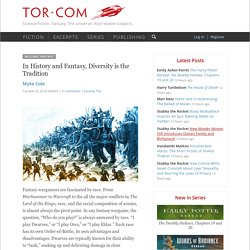
From Warhammer to Warcraft to the all the major conflicts in The Lord of the Rings, race, and the racial composition of armies, is almost always the pivot point. In any fantasy wargame, the question, “Who do you play?” Is always answered by race. “I play Dwarves,” or “I play Orcs,” or “I play Eldar.” Writing Women Characters Into Epic Fantasy Without Quotas. The cold equations of “realism,” some claim, suggest there is little scope for women taking an active and interesting role in epic stories set in fantasy worlds based in a pre-modern era.
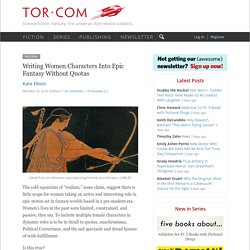
Check out these great female literary heroes for readers young and old. March is Women’s History Month, and Buzzfeed is celebrating with a list of 29 books featuring strong female protagonists.
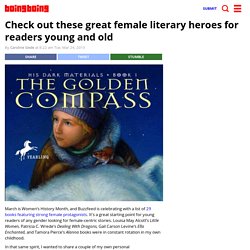
It's a great starting point for young readers of any gender looking for female-centric stories. Fantasy worlds that break history's back. If you’ve ever wondered why the future looks the same in so very many sci-fi games, books, and comics, you would be well served by considering their histories.

We can often blame poor character design or latent prejudice for the suffocating tropes that bedevil so much fictional media. But what role does worldbuilding play? After all, the society characters inhabit shapes and defines them, as does the history of the world you’ve drawn for them. But too often, fantasy worlds are created like Ikea furniture, popping up whole with minimal assembly from big pre-existing parts that creak and come apart after heavy use.
That’s why so many many fictional worlds seem to produce carbon copies of real world Western gender hierarchies, even if it becomes painfully dissonant with other details of the setting. For example, the Star Wars wiki says Knights of the Old Republic’s Admiral Dodonna is one of the few women serving at such a high rank in the Republic Navy. In fantasy worlds, historical accuracy is a lie. Paul Cook On SF: In Which I Lack The Ability To Even. You know, as strange as it may sound given how much time I spend ranting on the internet, I actually live a rich, full life, one in which I regularly leave the house and talk to my friends about a wide range of things that do not, in fact, suck.

I’m also a fairly busy person, especially right now, what with finishing up a new novel, writing various reviews and columns, tending my seven-month-old son and – oh, yeah – the fact that we just moved house. PSA: Your Default Narrative Settings Are Not Apolitical. Image taken from tumblr.

Recently, SFF author Tansy Rayner Roberts wrote an excellent post debunking the idea that women did nothing interesting or useful throughout history, and that trying to write fictional stories based on this premise of feminine insignificance is therefore both inaccurate and offensive. To quote: “History is not a long series of centuries in which men did all the interesting/important things and women stayed home and twiddled their thumbs in between pushing out babies, making soup and dying in childbirth.History is actually a long series of centuries of men writing down what they thought was important and interesting, and FORGETTING TO WRITE ABOUT WOMEN. “‘We Have Always Fought’: Challenging the ‘Women, Cattle and Slaves’ Narrative” by Kameron Hurley — A Dribble of Ink - Iceweasel.
I’m going to tell you a story about llamas.
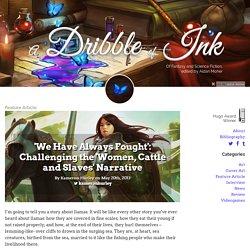
It will be like every other story you’ve ever heard about llamas: how they are covered in fine scales; how they eat their young if not raised properly; and how, at the end of their lives, they hurl themselves – lemming-like- over cliffs to drown in the surging sea.